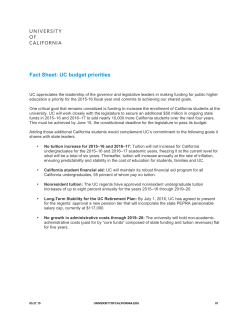
2015 Business Credit Analysis School Brochure
2015 Business Credit Analysis School An interactive environment empowering you to learn! Facilitated By: Vin DiCara Tuesday thru Thursday May 12-14, 2015 Location Forthcoming Denver, Colorado Program Overview Business lending can both diversify a financial institution's loan This 3-day Business Credit Analysis School is designed to portfolio and increase its return on assets. In order to be provide credit analysts and business lending officers with the successful in business lending, financial institutions need to tools necessary to perform in-depth evaluation of the credit have highly qualified personnel skilled in analyzing the needs of businesses. creditworthiness of business requests. types of challenges that businesses face in making debt service You will become acquainted with the payments and meeting other financial needs. The goal of this School is to develop analytical skills. At the conclusion of the program, you will thoroughly understand and discuss subjects that need to be addressed as part of a comprehensive credit analysis report. BENEFITS OF ATTENDING Vin DiCara ~ Facilitator VIN DiCARA is the owner of DiCara Training and Consulting, LLC which he established in early 2013. Previously, he was the owner of Development Finance Training and Consulting, Inc. which he cofounded in 2003. Mr. DiCara has been involved in evaluating the credit needs of businesses for over thirty years in a number of capacities, including business advocate, lender, credit analyst and trainer. Since 1995, Mr. DiCara has developed and conducted a wide variety of training programs for individuals who work in the financial services industry. Recent assignments have been with the New England College of Finance, the West Virginia, South Dakota, Virginia, Tennessee and North Dakota Bankers Association, and Chapters of the Center for Financial Training (CFT) in Southern New England, Northern New England, New Jersey, Ohio, and Colorado. Mr. DiCara’s training programs have become known for their ability to foster an informal and participatory environment in which students are empowered to learn. Mr. DiCara also currently serves as the Commercial Lending Officer for the Greater Portland Council of Governments (GPCOG). In this role, he oversees a public loan fund that provides subordinated debt financing to small businesses in Maine’s York and Cumberland Counties. His specific responsibilities include loan underwriting, liaison to area financial institutions, and the structuring of complex financing packages that utilize multiple sources of funds from the private and public sectors. Mr. DiCara works closely with a wide variety of banks and other traditional financing sources in the Southern Maine area. He also provides underwriting services to the Portland (Maine) Development Corporation. Mr. DiCara is a graduate of Bowdoin College in Brunswick, Maine and received a Masters Degree in Public Administration from the University of Maine. A native of Boston, Massachusetts, he has been a resident of the State of Maine for the last thirty-five years. Our nationally-recognized facilitator is top-notch in his field and you will have plenty of opportunity to share your questions during the School. This School is interactive, which creates an environment that empowers you to learn. You will receive a CERTIFICATE OF ACHIEVEMENT to document your ongoing commitment to your banking education. You will return to your bank a better asset and have new and valuable tools and skills to perform in-depth credit analysis. TRAINING & SAVINGS OPTIONS The School curriculum is designed to allow you to attend the Entire School for $900*, a $75 SAVINGS, or only those days that address your specific training needs for $325** per day. 10% Multiple Registration Discount Applies! Send more than one person the Entire School and SAVE an additional $90 or $32.50 per individual day! Tuition includes a light breakfast and lunch daily. It does not include lodging. (Non-Member Rate: *$1,350 or **$487.50 non-member) QUESTIONS? Contact Christine Bumgardner at 303-629-9662 or christineb@cftws.org Daily Program Descriptions Tuesday, May 12, 2015 8:00am—4:30pm INTRODUCTIONS AND OVERVIEW Types of business organizations - The differences between sole proprietorships, partnerships, Limited Liability Companies, S-Corporations and C Corporations. THE BUSINESS CREDIT ANALYSIS PROCESS A brief summary of basic topics and concepts that are part of the credit analysis process, including a review of the five C's of credit and an explanation of significant balance sheet and profit and loss statement accounts. THE BALANCE SHEET/CURRENT ASSETS The importance of cash Accounts Receivable: How to evaluate their quality Inventory: How to value it and determine its worth Short Term Notes Payable: Lines of Credit and when to use (and not use) them Trade Payables: A key indicator of a business' credit history Current Portion of Long-Term Debt (CPLTD) OPERATING CYCLES FOR MANUFACTURING, RETAIL, SERVICE, AND OTHER TYPES OF BUSINESSES Distinguishing between the operating cycles of different types of businesses and demonstrating how the length of operating cycles impacts cash flow. IDENTIFYING AND ANALYZING BALANCE SHEET TRENDS/ USING RATIOS AND OTHER ANALYSIS TECHNIQUES Discussion will focus on the use of a wide variety of ratios and predictive tools to assist in the analysis process. THE BALANCE SHEET/LONG-TERM ASSETS AND LONG-TERM LIABILITIES Fixed assets and the role of depreciation Intangible assets: When are they worth something to a lender? Long-term debt Officer debt NET WORTH: STOCK, RETAINED EARNINGS AND PAID-IN CAPITAL (AN OWNER'S INVESTMENT IN HIS/HER BUSINESS) Q & A PERIOD AND SESSION SUMMARY Wednesday, May 13, 2015 8:00am—4:30pm HOW THE PROFIT AND LOSS STATEMENT CAN ANSWER THE FOLLOWING QUESTIONS ABOUT A BUSINESS: Is the business growing? Are gross profit margins stable? Are overhead expenses under control? What kind of cash flow does the business have? How aggressively is the business using depreciation to reduce CASE STUDY AND DISCUSSION/BUSINESS TAX RETURNS CASHFLOW STATEMENTS Become acquainted with information contained in cash flow statements and how to utilize that information to better understand how a business is generating and using cash. taxable income? CASE STUDY/CASHFLOW STATEMENTS PROFIT AND LOSS STATEMENT CASE STUDY REPAYING LOANS FROM CASHFLOW, GUARANTEES OR COLLATERAL ANALYZING BUSINESS TAX RETURNS Identifying the differences between tax returns for various types of business organizations. Learn where you need to focus and what can be ignored in tax returns. The hazards of using interim financial information and the need to reconcile that information with end-of-theyear tax returns will also be addressed. Thursday, May 14, 2015 8:00am—3:00pm FINANCIAL PROJECTIONS Understanding financial projections is an important tool in the credit analysis process. Examine the ways in which analysts can test the assumptions that a business uses a basis for its financial projections. In addition, attendees will learn the mechanics of developing projections for balance sheets and profit and loss statements. STARTUP BUSINESSES/SOURCES OF FINANCING Explore a variety of startup issues, including typical sources of capital, the role of angel investors and venture capital, and analyzing a business with no history. SOURCES OF TECHNICAL ASSISTANCE BUSINESSES AND OTHER BUSINESSES FOR STARTUP Learn about Small Business Administration's SCORE and SBDC programs and other technical assistance providers readily available to assist business owners. PERSONAL Explore the advantages and disadvantages of these three methods of loan repayment. Personal Financial Statements will also be discussed. Q & A PERIOD AND SESSION SUMMARY DEBT FINANCING FOR NON-TRADITIONAL PUBLIC AND PRIVATE NON-PROFIT SOURCES Become familiar with the types of loan incentives available through organizations such as the Small Business Administration, U.S. Department of Agriculture, and regional development organizations. LOAN PORTFOLIO MANAGEMENT ISSUES/ PORTFOLIO RISK ANALYSIS Gain an understanding of evaluating the quality of an entire loan portfolio through the use of a variety of management tools. The ways in which credit quality can impact the financial standing of an organization will also be discussed. Examine loan covenants and other portfolio management tools and learn how to properly structure different types of loans. Q & A PERIOD AND SESSION SUMMARY Registration Form TRAINING INVESTMENT TUITION FOR ENTIRE SCHOOL First Attendee = $900.00* Additional Attendees = $810.00** ($1,350.00/$1,215.00 non-member) Name: ______________________________________________________________ Title: _______________________________________________________________ TUITION PER DAY First Attendee = $325.00* Additional Attendees = $292.50** ($487.50/$438.75 non-member) Organization: ________________________________________________________ Street Address: _______________________________________________________ Tuition includes a light breakfast and lunch daily (excludes lodging) and the Student Handbook. City/State/Zip Code: ___________________________________________________ *Early Tuition ~ Register By: Business Phone: ______________________________________________________ APRIL 14, 2015 Cell Phone (in case of emergency): ________________________________________ To ensure your attendance and receive the ‘EARLY’ Tuition Rate quoted above, please register by TUESDAY, APRIL 14, 2015. Tuition will increase by $100.00 for the Entire School and $25.00 for an individual day, after April 14th. E‐Mail Address: _______________________________________________________ Student Signature: ____________________________________________________ **10% Multiple Registration Discount: Please REGISTER ALL ATTENDEES AT ONCE to receive the Additional Attendees Discount Rate above. TRAINING CHOICE Attending ENTIRE SCHOOL (05/12-05/14-2015), #N6623A1F12 = $900.00* Attending DAY ONE Only (05/12/2015), #N6624A1F12 = $325.00** Attending DAY TWO Only (05/13/2015), #N6625A1F12 = $325.00** Attending DAY THREE Only (05/14/2015), #N6626A1F12 = $325.00** REFUND POLICY On or before April 14, 2015: $100.00 Entire School $75.00 Individual Day After April 14, 2015: NO Refund (although a substitute may attend) 10% Multiple Registration Discount Applies—Additional Registration Form(s) attached. *Non-Member Rate $1,350.00; **Non-Member Rate $487.50 ATTIRE Casual, comfortable attire is recommended. PAYMENT OPTIONS LODGING Tuition DOES NOT include lodging. Students are responsible for securing their own lodging. CFTWS is finalizing the training location (in the Denver-metro area) and securing a block of sleeping rooms. This information will be provided to the attendees once this information has been confirmed. QUESTIONS? Contact Christine Bumgardner 303-629-9662 or christineb@cftws.org TOTAL AMOUNT DUE $_____________________ TUITION PAYMENT OPTIONS: *Bill Organization Check enclosed (payable to CFTWS) *Authorized Signature for Billing: _______________________________________________ VISA/MC #: _____________________________________________Exp. Date________ Cardholder’s Name: ________________________________________________________ Signature: ________________________________________________________________ FAX: 303-629-1591 MAIL: CFTWS, 5310 Ward Road, Suite 211, Arvada, CO 80002 E-MAIL: info@cftws.org REGISTER ONLINE: www.CFTWS.org/Education 5310 Ward Road, Suite 211, Arvada, CO 80002 303-825-1590 303-629-1591 (fax) info@cftws.org CFTWS does not discriminate on the basis of race, color, gender, age, and national or ethnic origin.
© Copyright 2025









